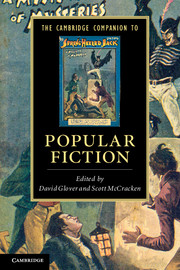Book contents
- Frontmatter
- Introduction
- 1 Publishing, history, genre
- 2 Fiction, theatre and early cinema
- 3 Television and serial fictions
- 4 The public sphere, popular culture and the true meaning of the zombie apocalypse
- 5 The reader of popular fiction
- 6 Reading time: popular fiction and the everyday
- 7 Gender and sexuality in popular fiction
- 8 Pulp sensations
- 9 Bestselling fiction: machinery, economy, excess
- 10 Comic books and graphic novels
- 11 Popular fiction in the digital age
- Further reading
- Index
- Cambridge Companions to …
6 - Reading time: popular fiction and the everyday
Published online by Cambridge University Press: 28 May 2012
- Frontmatter
- Introduction
- 1 Publishing, history, genre
- 2 Fiction, theatre and early cinema
- 3 Television and serial fictions
- 4 The public sphere, popular culture and the true meaning of the zombie apocalypse
- 5 The reader of popular fiction
- 6 Reading time: popular fiction and the everyday
- 7 Gender and sexuality in popular fiction
- 8 Pulp sensations
- 9 Bestselling fiction: machinery, economy, excess
- 10 Comic books and graphic novels
- 11 Popular fiction in the digital age
- Further reading
- Index
- Cambridge Companions to …
Summary
When the bedside telephone in his Paris hotel room rings in the middle of the night, Robert Langdon, the hero of Dan Brown's bestselling novel, The Da Vinci Code, awakes slowly and is at first confused.
Where the hell am I?
The jacquard bathrobe hanging on his bedpost bore the monogram: HOTEL RITZ PARIS.
Next his eyes focus on ‘a crumpled flyer on his bedside table’:
THE AMERICAN UNIVERSITY OF PARIS
proudly presents
AN EVENING WITH ROBERT LANGDON
PROFESSOR OF RELIGIOUS SYMBOLOGY, HARVARD UNIVERSITY
A famous academic as well as an accidental detective, it is not surprising that Robert Langdon orientates himself through reading. He is prodigiously well read, supplying much of the overload of information for which Brown's thrillers are notorious. But Langdon's love of reading does not make him unusual amongst fictonal sleuths. A very different detective, Mikael Blomkvist, the left-wing, journalist hero of Stieg Larsson's ‘Millennium Trilogy’, is also a voracious reader, getting through piles of documents, obtained both legally and illegally, as he tracks down murderers, sex traffickers and rogue spies in the Swedish secret service. The reading skills of his partner and sometime lover, Lisbeth Salander, are facilitated by a photographic memory. Easy Rawlins, the self-educated detective in Walter Mosley's series of novels, betrays his reading by his speech: ‘Why Easy … I do believe that you have read a book or two,’ remarks one of the many femmes fatales he encounters on his investigations in Los Angeles.
- Type
- Chapter
- Information
- The Cambridge Companion to Popular Fiction , pp. 103 - 121Publisher: Cambridge University PressPrint publication year: 2012

